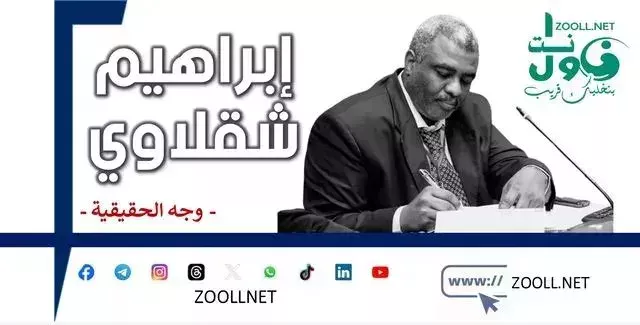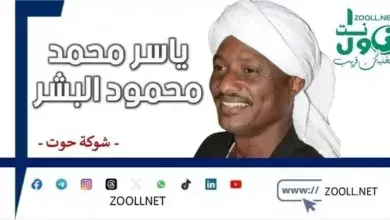Hussein Abdel Dafi Mukhtar: “The tragedy of the Sabreen market – The face of the truth – ✍️ Ibrahim Shaqlawi

The hero of our story asked that we write about him with that full name because he told me about his resilience in the face of sadness and destruction and all his suffering from the start of the war to mid- April last year. This is how Hussein Abdel-Dafi Mukhtar spoke of his simple and hopeful life and the Omdurman market, which he considered the center of his success, where he sold food and made a living from it with his small family. . These days were calm days, full of hope for the future. Her dream was to have a small house for her children, a simple dream so that they could live in safety.
Then came the day when everything was taken away from him. Hussein told me the details with great emotion and sadness, as if the pain was returning to his heart. In the first days of the outbreak of war, the bombings began to come closer and closer. None of us expected that the war would reach the heart of the capital, all the way to the Omdurman market, which was once a place full of life and people. Hussein was standing among the customers, buying and selling, when he heard a huge explosion. The ground beneath his feet shook, everything suddenly shook. Then came the sound: a shell destroyed the place where he was, destroying the market and destroying his only means of livelihood.
“This is a moment we will never forget,” Hussein said, looking away, as if the image of the destroyed place was still fresh in his mind. “Everything is lost in an instant, Ibrahim. My store, the money I had saved, even my memories with my customers and my comrades, everything turned into ashes. His tone was full of sadness, but I sensed something else in him: it was steadfastness, unwavering will and strength, and tragedy and disappointment in those who struggled for power.
Each time he came back to himself, trying to hide the pain in his heart to protect his family, but he knew they all felt what had happened. Although he didn't want to worry his wife and children, they knew very well that a disaster had befallen them. They knew their lives had changed forever.
“I came home in disbelief,” Hussein said as he continued his speech, “and I saw my children and my wife all waiting for news from the market.” The hardest part was that I couldn't tell them the truth. I can't tell them we lost everything. But they felt it, they knew it. » These moments experienced by Hussein were full of contradictions, between hope and pain, between the desire for secrecy and the internal conflict that he experienced in a state of confusion.
As the days passed, the war became fiercer. The bombings continued and the militias wreaked havoc in the city. Hussein and his family had no choice but to flee. They fled from one place to another, until they settled in a small rental house in Ward 17. The room they rented was narrow, barely big enough for a family of six people. This simple house always reminded him of a tent, even though it wasn't.
“At first the pain was greater than anything, but after a while I started to say to myself, 'We have to persevere.' » This war, however long it lasts, does not break people. Our country is alive, even if times are difficult, we must be strong. Hussein's eyes were full of tears, but his voice was firm, as if time had stopped at that moment when he had lost everything, but he was clinging to what was left to him: family, homeland and home. loyalty to this place he had always loved.
Even when his wife looked sadly into his eyes, and smiled at him with a sad smile as she distributed a little food to the children, he found within himself the strength to tell them: “The army is in our hearts, the army will win, this country will not collapse, we are an unshakable people and security will return. » He repeated these words every day as if they were the crutch on which he leaned to get back up despite all the challenges.
In the midst of suffering, steadfastness rose from deep within me and refused to give up. Every time he looked at his children, he felt that life would return, no matter how long it took. “A new life awaits us, even though he knew the road was long and they had lost everything. » but he believed that this country which had stolen everything from them would finally give them what they deserve: hope, security and freedom.
But Hussein did not know that the day he would say these words would be the anniversary of International Human Rights Day, at a time when a new massacre was being committed against civilians in the locality of Karari, where a transport bus public was subjected to gunfire. artillery fire at the Sabreen market, located next to his house, resulted in the martyrdom of 65 people. Among the innocent citizens, most from the region, the tragedy of Hussein is that one of those who lost his life that day was the uncle of his children. , who was traveling in search of “insulin injections”. Hussein felt that the tragedy he was experiencing had doubled and that the oppression he faced was greater than he could bear.
He spoke to me sadly while reading a report published by “Khartoum News”, which reported that the Rapid Support militia had targeted citizens in the town of Karari, killing more than 65 people and injuring more than two hundred. The hospitals were filled with corpses and wounded. Khartoum Governor Ahmed Othman Hamza stood alongside the state security committee to inspect the bombing sites at Al-Har 17 bus stop, where the bus turned into a heap body parts, and all 22 people on board were killed. The bombings also targeted the area around the market and residential areas, places known to be very frequented by citizens.
The governor denounced this massacre and condemned the targeting of innocent civilians, calling on the international community and humanitarian organizations to condemn these violations against civilians who have become victims of the militias' policy of murder and destruction. A number of national parties also condemned the massacre. Even those who support the militia and support it politically and in the media.
At Al-Naw Hospital, where many of the wounded were, Hussein watched as doctors did everything they could to save what could be of the wounded, but he knew that this conflict would continue and people would continue to pay. the high price. price. But that didn't discourage him. He stood, looked at the scene and said: “But we will stand firm and fight for our homeland. »
This is how Hussein Abdel Dafi spoke of his tragedy, and this is the face of truth, as if the words with which he tells his story were a cry in the face of injustice and a victory of loyalty. No matter how much time has passed and what wounds he has suffered, his heart still beats with love for this country which, whatever the circumstances, will remain strong and defy difficulties.
May you always be well.
Thursday December 12, 2024 (email protected)




